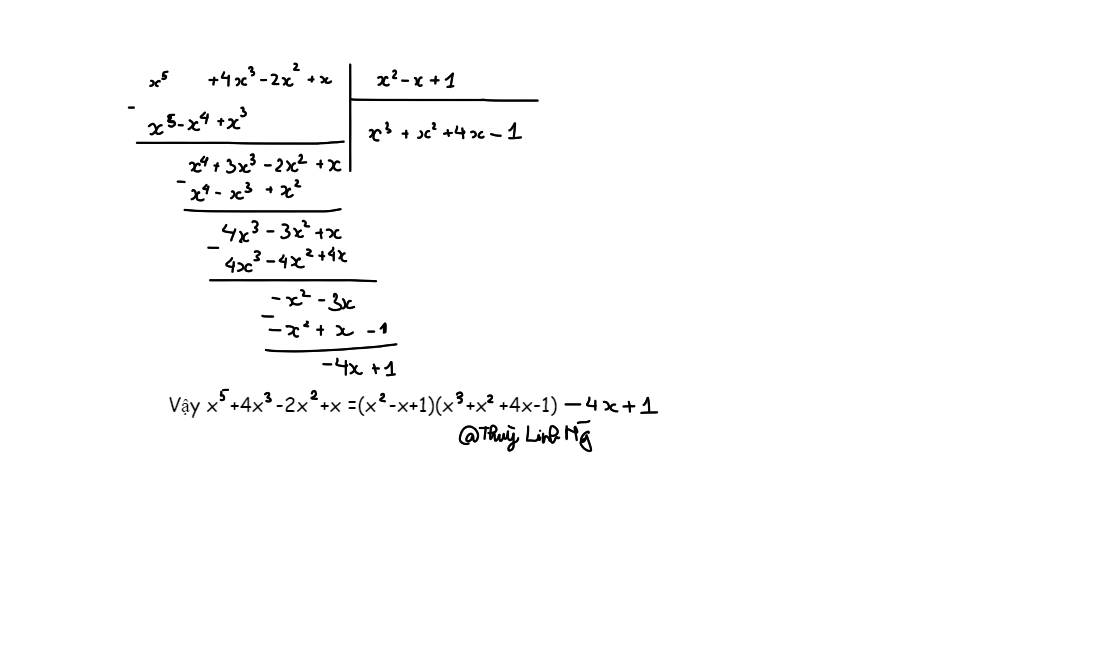(6x4-4x3+x2+x):(2x2+2x+1)
Hãy nhập câu hỏi của bạn vào đây, nếu là tài khoản VIP, bạn sẽ được ưu tiên trả lời.


6: \(-x^2y\left(xy^2-\dfrac{1}{2}xy+\dfrac{3}{4}x^2y^2\right)\)
\(=-x^3y^3+\dfrac{1}{2}x^3y^2-\dfrac{3}{4}x^4y^3\)
7: \(\dfrac{2}{3}x^2y\cdot\left(3xy-x^2+y\right)\)
\(=2x^3y^2-\dfrac{2}{3}x^4y+\dfrac{2}{3}x^2y^2\)
8: \(-\dfrac{1}{2}xy\left(4x^3-5xy+2x\right)\)
\(=-2x^4y+\dfrac{5}{2}x^2y^2-x^2y\)
9: \(2x^2\left(x^2+3x+\dfrac{1}{2}\right)=2x^4+6x^3+x^2\)
10: \(-\dfrac{3}{2}x^4y^2\left(6x^4-\dfrac{10}{9}x^2y^3-y^5\right)\)
\(=-9x^8y^2+\dfrac{5}{3}x^6y^5+\dfrac{3}{2}x^4y^7\)
11: \(\dfrac{2}{3}x^3\left(x+x^2-\dfrac{3}{4}x^5\right)=\dfrac{2}{3}x^3+\dfrac{2}{3}x^5-\dfrac{1}{2}x^8\)
12: \(2xy^2\left(xy+3x^2y-\dfrac{2}{3}xy^3\right)=2x^2y^3+6x^3y^3-\dfrac{4}{3}x^2y^5\)
13: \(3x\left(2x^3-\dfrac{1}{3}x^2-4x\right)=6x^4-x^3-12x^2\)

a) \(\Leftrightarrow x^2-x-x^2+2x=5\)
\(\Leftrightarrow x=5\)
b) \(\Leftrightarrow4x\left(x^2-9\right)=0\)
\(\Leftrightarrow4x\left(x-3\right)\left(x+3\right)=0
\)
\(\Leftrightarrow\)\(\left[{}\begin{matrix}4x=0\\x-3=0\\x+3=0\end{matrix}\right.\)
\(\Leftrightarrow\)\(\left[{}\begin{matrix}x=0\\x=3\\x=-3\end{matrix}\right.\)
Vậy x = 0 , x = 3 hoặc x = -3
\(a,\Leftrightarrow x^2-x-x^2+2x=5\\ \Leftrightarrow x=5\\ b,\Leftrightarrow4x\left(x^2-9\right)=0\\ \Leftrightarrow4x\left(x-3\right)\left(x+3\right)=0\\ \Leftrightarrow\left[{}\begin{matrix}x=0\\x=3\\x=-3\end{matrix}\right.\\ c,\Leftrightarrow2x\left(x-1\right)-\left(x-1\right)^2=0\\ \Leftrightarrow\left(x-1\right)\left(2x-x+1\right)=0\\ \Leftrightarrow\left[{}\begin{matrix}x=1\\x=-1\end{matrix}\right.\\ d,\Leftrightarrow\left(x^2-9x+14\right)\left(x^2-9x+20\right)-72=0\\ \Leftrightarrow\left(x^2-9x+17\right)^2-3^2-72=0\\ \Leftrightarrow\left(x^2-9x+17\right)^2-81=0\\ \Leftrightarrow\left(x^2-9x+17-9\right)\left(x^2-9x+17+9\right)=0\\ \Leftrightarrow\left(x-8\right)\left(x-1\right)\left(x^2-9x+26\right)=0\\ \Leftrightarrow\left[{}\begin{matrix}x=8\\x=1\\\left(x-\dfrac{9}{2}\right)^2+\dfrac{23}{4}=0\left(vô.n_0\right)\end{matrix}\right.\Leftrightarrow\left[{}\begin{matrix}x=1\\x=8\end{matrix}\right.\)

1. Đề bài sai, các biểu thức này chỉ có giá trị lớn nhất, không có giá trị nhỏ nhất
2.
\(A=\left(2x\right)^3-3^3-\left(8x^3+2\right)\)
\(=8x^3-27-8x^3-2\)
\(=-29\)
\(B=x^3+9x^2+27x+27-\left(x^3+9x^2+27x+243\right)\)
\(=27-243=-216\)
sửa đề lại thành tìm Max nhé1, vì mấy ý này ko có min
\(1,=>D=-\left(x^2-4x-3\right)=-\left(x^2-2.2x+4-7\right)\)
\(=-[\left(x-2\right)^2-7]=-\left(x-2\right)^2+7\le7\)
dấu"=" xảy ra<=>x=2
2, \(E=-2\left(x^2-x+\dfrac{5}{2}\right)=-2[x^2-2.\dfrac{1}{2}x+\dfrac{1}{4}+\dfrac{9}{4}]\)
\(=-2[\left(x-\dfrac{1}{2}\right)^2+\dfrac{9}{4}]\le-\dfrac{9}{2}\) dấu"=" xảy ra<=>x=1/2
3, \(F=-\left(x^2+4x-20\right)=-\left(x^2+2.2x+4-24\right)\)
\(=-[\left(x+2\right)^2-24]\le24\) dấu"=" xảy ra<=>x=-2

8x5+4x3+(x2-2).(-8x3)=20
8x5+4x3-8x5+16x3=20
20x3 =20
x3 =1
x =1
vậy x=1

Bài 1:
a) Ta có: \(P=1+\dfrac{3}{x^2+5x+6}:\left(\dfrac{8x^2}{4x^3-8x^2}-\dfrac{3x}{3x^2-12}-\dfrac{1}{x+2}\right)\)
\(=1+\dfrac{3}{\left(x+2\right)\left(x+3\right)}:\left(\dfrac{8x^2}{4x^2\left(x-2\right)}-\dfrac{3x}{3\left(x-2\right)\left(x+2\right)}-\dfrac{1}{x+2}\right)\)
\(=1+\dfrac{3}{\left(x+2\right)\left(x+3\right)}:\left(\dfrac{4}{x-2}-\dfrac{x}{\left(x-2\right)\left(x+2\right)}-\dfrac{1}{x+2}\right)\)
\(=1+\dfrac{3}{\left(x+2\right)\left(x+3\right)}:\dfrac{4\left(x+2\right)-x-\left(x-2\right)}{\left(x-2\right)\left(x+2\right)}\)
\(=1+\dfrac{3}{\left(x+2\right)\left(x+3\right)}\cdot\dfrac{\left(x-2\right)\left(x+2\right)}{4x+8-x-x+2}\)
\(=1+3\cdot\dfrac{\left(x-2\right)}{\left(x+3\right)\left(2x+10\right)}\)
\(=1+\dfrac{3\left(x-2\right)}{\left(x+3\right)\left(2x+10\right)}\)
\(=\dfrac{\left(x+3\right)\left(2x+10\right)+3\left(x-2\right)}{\left(x+3\right)\left(2x+10\right)}\)
\(=\dfrac{2x^2+10x+6x+30+3x-6}{\left(x+3\right)\left(2x+10\right)}\)
\(=\dfrac{2x^2+19x-6}{\left(x+3\right)\left(2x+10\right)}\)

Ta có
P ( x ) = 2 x 3 − 3 x + x 5 − 4 x 3 + 4 x − x 5 + x 2 − 2 = x 5 − x 5 + 2 x 3 − 4 x 3 + x 2 + ( 4 x − 3 x ) − 2 = − 2 x 3 + x 2 + x − 2 Và Q ( x ) = x 3 − 2 x 2 + 3 x + 1 + 2 x 2
= x 3 + - 2 x 2 + 2 x 2 + 3 x + 1 = x 3 + 3 x + 1
Khi đó
P ( x ) − Q ( x ) = − 2 x 3 + x 2 + x − 2 − x 3 + 3 x + 1 = − 2 x 3 + x 2 + x − 2 − x 3 − 3 x − 1 = − 2 x 3 − x 3 + x 2 + ( x − 3 x ) − 2 − 1 = − 3 x 3 + x 2 − 2 x − 3
Chọn đáp án B

(4x3 + 2x2 − 1) − (4x3 − x2 + 1)
= 4x3 + 2x2 – 1 – 4x3 + x2 – 1
= (4x3 – 4x3) + (2x2 + x2 ) – (1+ 1)
= 3x2 – 2
Chọn đáp án C

\((6x^4-4x^3+x^2+x):(2x^2-2x+1)=3x^2+x\)